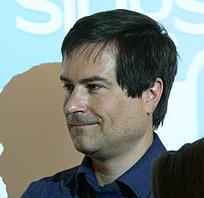Related Research Articles

Arts Council England is an arm's length non-departmental public body of the Department for Culture, Media and Sport. It is also a registered charity. It was formed in 1994 when the Arts Council of Great Britain was divided into three separate bodies for England, Scotland and Wales. The arts funding system in England underwent considerable reorganisation in 2002 when all of the regional arts boards were subsumed into Arts Council England and became regional offices of the national organisation.
The creative industries refers to a range of economic activities which are concerned with the generation or exploitation of knowledge and information. They may variously also be referred to as the cultural industries or the creative economy, and most recently they have been denominated as the Orange Economy in Latin America and the Caribbean.

Abertay University, formerly the University of Abertay Dundee, is a public university in the city of Dundee, Scotland. In 1872, Sir David Baxter, 1st Baronet of Kilmaron, left a bequest for the establishment of a mechanics' institute in Dundee and the Dundee Institute of Technology was formed in 1888. As early as 1902 it was recognised by the Scottish Education Department as an educational hub, and was one of the first to be designated a central institution, akin to an "industrial university". Abertay gained university status in 1994.

David John Braben is a British video game developer and designer, founder and CEO of Frontier Developments, and co-creator of the Elite series of space trading video games, first published in 1984. He is also a co-founder of and works as a trustee for the Raspberry Pi Foundation, which in 2012 launched a low-cost computer for education.
A social enterprise is an organization that applies commercial strategies to maximize improvements in financial, social and environmental well-being. This may include maximizing social impact alongside profits for co-owners.

Sir Peter Lytton Bazalgette is a British television executive and producer, also active in the fields of the arts and the broader Creative Industries. Currently he is co-Chair of the Creative Industries Council, pro Chancellor and Chair of Council at the Royal College of Art, a non-executive board member at the Department of Education, Business Council chair of the Care Leavers Covenant, chair of the Baillie Gifford non fiction book prize and senior independent director on the board of Saga plc. He was elected President of the Royal Television Society and Deputy Chairman of the National Film School. He was knighted in the New Year Honours for 2012 for services to broadcasting. He has been a benefactor to the arts and Chairman of English National Opera. He was Chair of Arts Council England from 2012 until 2016 and Chairman of ITV from 2016 to 2022. He is also Chair of LoveCrafts, the online retailer. He was a non-executive board member of UK Research and Innovation (UKRI) and also served on the advisory board of BBH. He sat on the board of the market researcher, YouGov, from 2003 to 2013. In January 2017, his latest book The Empathy Instinct was published.

The Development Bank of Southern Africa (DBSA) is a development finance institution wholly owned by the Government of South Africa. The bank intends to "accelerate sustainable socio-economic development in the Southern African Development Community (SADC) by driving financial and non-financial investments in the social and economic infrastructure sectors".

China Investment Corporation is a sovereign wealth fund that manages part of China's foreign exchange reserves. China's largest sovereign fund, CIC was established in 2007 with about US$200 billion of assets under management, a number that grew to US$1,200 billion in 2021 and US$1,350 billion in 2023.

4J Studios Limited is a British independent video game developer based in Dundee. It has a second office located in East Linton. Founded in April 2005 by VIS Entertainment alumni Chris van der Kuyl, Paddy Burns and Frank Arnot, the company is best known for porting Minecraft to consoles and handheld platforms.
Dare to be Digital is a video games design competition targeted at university students and recent graduates, started by and held at Abertay University, Scotland since 2000.
Crown Agents Ltd is a not-for-profit international development company with head office in London, United Kingdom, and subsidiaries in the United States and Japan. Incorporated as a private limited company Crown Agents Ltd has only one shareholder – the Crown Agents Foundation, a not-for-profit company. Crown Agents Ltd's registered office is in Southwark, London.

Rockstar Dundee Limited is a British video game developer and a studio of Rockstar Games based in Dundee. The studio is best known for developing Crackdown 2.
The United Kingdom has the largest video game sector in Europe. By revenue, the UK had the second largest video game market in Europe in 2022 after Germany, and the sixth largest globally. By sales, it is Europe's largest market, having overtaken Germany in 2022. The UK video game market was worth £7.16 billion in 2021, a 2% increase over the previous year.
The Independent Music Companies Association (IMPALA), originally the Independent Music Publishers and Labels Association, is a non-profit trade association established in 2000 to help European independent record labels represent their agenda and promote independent music. Its offices are in Brussels, Belgium. IMPALA is a member of the Worldwide Independent Network (WIN), a coalition of independent music bodies from countries throughout the world.
Anthony Roiall Banks is a British businessman, author and Falklands veteran. He is the chairman and founder of the award-winning Balhousie Care Group, Scotland’s largest private residential care home provider. He is chairman of Business for Scotland and is a vocal supporter of Scottish Independence.
Creative Sector Tax Relief is a programme of tax incentives implemented in the United Kingdom in 2012 which encompass new incentives aimed at supporting the animation, high-end television and video game industries, in addition to the existing relief available for film production. The new reliefs are designed to promote culturally-relevant productions in the UK, to incentivise investment into UK productions that would otherwise take place outside the UK, and to support the necessary critical mass of infrastructure and skills in the UK for both today and in the longer term.
MIT School of Telecom Management, Pune, is a higher education institution in Pune, India. The school, established in 2007, is one of MAEER's MIT Group of Institutions. It is supported by the industry in designing the academic curriculum.

Creative UK is a not-for-profit organisation that supports the creative industries in the United Kingdom. The business promotes the development of creative companies, which in turn support business across games, film, creative and digital media as well as production services. The company works in partnership with the British Film Institute, has offices in Bristol and Salford, and operates predominantly outside of the city of London.
The Creative Industries Federation (2014-2021) was a national organisation for all the UK's creative industries, cultural education and arts. It advocated for the sector, aiming to ensure that the creative industries were central to political, economic and social decision-making.

The Basel Institute on Governance is an independent, international non-profit organisation dedicated to preventing and combating corruption and other financial crimes and to strengthening governance around the world. The organisation was established in Basel, Switzerland in 2003 by Professor Mark Pieth.
References
- ↑ "£4m fund to kickstart the next 'Tomb Raider'". UK Government. 12 October 2015. Retrieved 15 May 2023.
- ↑ "UK Games Fund". UK Games Fund. Retrieved 15 May 2023.
- ↑ "Welcome to the Prototype Fund Website". Abertay University. Archived from the original on 28 February 2011.
- ↑ "UK Games Talent and Finance CIC". UK Government Companies House. Retrieved 15 May 2023.
- 1 2 "Tranzfuser". Tranzfuser. Retrieved 15 May 2023.
- 1 2 3 "Independent Report: Independent Review of the Creative Industries". UK Government. 22 September 2017. Retrieved 16 May 2023.
- ↑ "Creative Industries: Sector Deal". UK Government. Retrieved 15 May 2023.
- ↑ "£50 million of Government Investment announced for creative businesses across the UK". UK Government. Retrieved 15 May 2023.
- ↑ "Creative Sector Vision". UK Government. 14 June 2023. Retrieved 15 June 2023.
- ↑ "Tranzfuser in the time of coronavirus". Gamesindustry.Biz. 24 September 2020. Retrieved 16 May 2023.
- ↑ "DunDev". DunDev. Retrieved 16 May 2023.
- ↑ "Aspiring games firms could win month's Dundee stay and £25,000". Dundee Courier. 26 October 2022. Retrieved 16 May 2023.